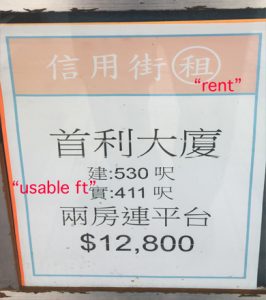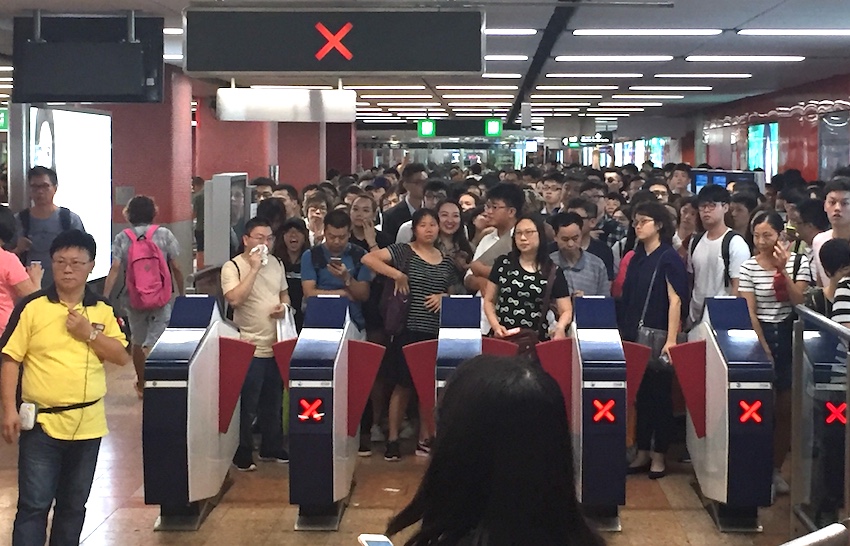Apartment Hunt Factors
Are you looking to rent in Hong Kong or China? Factors to consider…
I wrote this to remind myself about what I learned while looking for our first apartment in Hong Kong (2015), but many of these factors would also apply in China, or other high-density locations.
by Michael Krigline, October 2015; revised 2017. wp.krigline.com ⇔If you want to read a good summary of what it’s like to rent in Hong Kong, try this link: www.brickunderground.com/escape/the-expat-renter-Hong-Kong (“A New Yorker’s guide to the Hong Kong apartment hunt”)
Here’s my advice:

Hong Kong rental agency sign
–Get a local friend to teach you how to read the signs, but “beware.” First, many window signs were a “great deal” when they were posted, months ago; now they are just there to attract attention, long after the property has been leased. Also note that there are normally two “sq ft” numbers; the big one counts the balcony, outside hallway and other useless space; the smaller number is “usable” footage. If there’s only one number, you can bet it’s the “useless” number.
–Be prepared to make an offer the first time you visit, for the best deals do not stay on the market long (sometimes only hours). This is why it is important to have a friendly agent, constantly looking for you. I can recommend agents in Mongkok (use the contact form to reach me). In general, it is best to pick an area you want to live, and then a realtor in that area, though there are a few “big realty companies” in HK, and they could help you in a number of areas. Nonetheless, I understand that properties are listed locally, and many are only available at one realtor or another (unlike the US, where this info is widely shared). In 2017, I had three realtors looking for me; only twice did they take me to the same property, and those had been on the market for a while.
–Should you look at online realty sites? I understand that if your income is at “banker” level, these sites can be helpful. But for my income bracket they are about as useful as the signs realtors put on their windows (see above).
–Location; we prefer either walking distance to work, or close to good public transportation
–Plan to ride a bus? They are not easy for visitors to figure out, though it might be ok if you don’t expect visitors. If you are not near the starting point, mini buses can’t stop if they are full. After viewing a flat outside “the big city”, we waited 30 min for a bus with seats, gave up and flagged a taxi. And that wasn’t rush hour. The “green” mini-buses have a fixed route, but you must tell the driver, in Cantonese (the ones I’ve been around don’t speak Mandarin or English), when you want to get off. I also noticed that the driver sometimes changes his route to avoid traffic, so you MUST tell him where you want to get off, and must be able to understand what he says if he is trying to explain that he won’t stop there (I couldn’t understand/communicate, so I avoided these buses). The “red” mini-buses don’t have a fixed route, require a Cantonese conversation, and are beyond my comprehension!
–Does the building have Internet access and a good signal for your mobile phone? In the heart of the city, it shouldn’t be a problem, but if you decide to live away from the city noise, you may be away from Internet access or decent phone coverage too. Not every Internet or cable provider serves every building, so if this is important, be sure you know the details before you sign the lease. And of course, there’s no telling how good your connection will be once the service is connected. Our 2017 flat (using iCable) has a very good speed in the morning, but it’s functionally useless in the evening.

Same seat in my 2017 Mongkok apartment, at different times, using “data” vs “wifi”
–Groceries and water. Will you be lugging suitcases to the grocery store by bus and MTR twice a week (not a good idea!)? Or can you walk home from a local store and then take an elevator? Plan to buy a water filter system (ours is a counter-top model from the UK), so you don’t have to lug water up stairs, or to find a space big enough for the bottled water. HK water is safe enough to use filtered, but we drank bottled water in China. And speaking of water, TRY the faucet while you look at apartments. We ended up on the top floor in 2017, with a nice view but almost NO water pressure in the shower. Lower floors tend to have better water pressure.
–Are there steps? Will you or friends have to lift suitcases, groceries, etc., up steps? Some apartments have steps to the first floor, and then an elevator. If you have elderly friends or relatives, or buy heavy groceries often, avoid steps.
–Where will you put a washer (it needs water and a drain) and fridge? Does the kitchen have room for both (not likely in HK)?
–How does the bathroom look? Can you bend and turn around in there? Is there a place to plug in your hair dryer? (Not likely in HK.) If you are married, be sure your wife approves of the bathroom!
–Is the place cleanable, or will it always feel sort of dirty? (My wife is better at evaluating this than I am. Almost every apartment we looked at–at our low price range–was “dirty,” so “Is it clean” didn’t help as much as the question “Is it cleanable“.
–Can you live with the way the walls look? Wallpaper? Color? Chipped paint for kids or pets to eat? Don’t expect your landlord to pay for a new coat of paint, or anything else. Our landlord even expected us to pay for air-conditioner service when we complained that it didn’t seem to be working right (we cleaned the filter, and it worked much better–but what if the problem had been serious?).
–Sounds; this is hard to gauge, but street or train noise can bother some people. In Mongkok, the streets below us are always busy–night and day–but if you rent above other parts of Mongkok you would be in for a worse surprise, such as amplified singing on pedestrian streets every evening, or the crash of poles setting up or tearing down the night market every night from 11pm to 7am. Every night. So, try to find out what the place will sound like in the evening before you sign the final contract.
–Smell; again, this is hard to judge, but are you above a restaurant? Do your neighbors throw dirty diapers or garbage into the “common hole,” an internal chimney of sorts for all the kitchens and bathrooms? Have candles handy from day one. If possible, you WANT to be there just before a meal so you can smell the neighbors’ cooking with windows open. In our first HK apartment, the passage from our elevator to the room had no ventilation, and cooking smells are strong. That apartment was also six floors about a restaurant, and obviously also lived above a smoker (we can tell because the window-mounted AC sucks air from the outdoors). If you are sensitive to such things, don’t expect to have the windows open often.
–Is the landlord an individual or a company with lots of apartments; each has advantages and risks.
–Electric plugs; if not enough, will the wiring suffice? We have to have extension cords running in many directions from an insufficient number of plugs. If you are moving from China, you’ll need lots of bulky conversion plugs. If you are moving from the US or Taiwan, you need to replace anything that doesn’t have dual voltage.
–Can you run all AC units and the washer at once without blowing a fuse? (Not likely, in either HK or China!)
–Footage is important, but deceptive; layout may be more important. A long hall or long room may be useless space. Before you sign anything, think about how you will use the space.
–Most of the apartments we looked at in HK were unfurnished. We were told that HK people prefer to have their own furniture, for hygiene reasons. But if you are not planning to live there long, you might want a furnished flat or service apartment. Oh, and if you buy furniture at IKEA, company policy is that they cannot assemble it for you unless you allow them to attach it to the wall–be sure you know where you want it before they arrive! I self-assembled an IKEA wardrobe and chair; the chair wasn’t hard, but the wardrobe took a lot of time and effort, and at least two people. Next time, I’ll let them put it together. I can also recommend the following (cheaper; assembled; not attached to wall furniture): http://www.shinway.com/
In June 2017, I thought of one more reason to rent close to where I work: typhoons (or to be more precise: avoiding transport in bad weather). Hong Kong’s public transportation system is normally wonderful, but Mother Nature can play havoc with everything. A series of warnings lets us know as a typhoon or other serious storm is approaching. When it gets to a certain level, buses stop running, and soon thereafter the subways stop too (some parts are above ground). The law says that unessential personnel have the right to head home before the transportation system shuts down. Well, on June 12, I let my staff leave at 4 pm, but I stayed at the office until 6 pm–when even I thought it would be better to be at home than to keep working at the office. I ducked into the Mongkok station (as I often do, because it is dry and air conditioned–and gets me half-way home), and saw one of the biggest crowds I’d ever seen. It looked like this in all directions, and the “subway mall” is almost a quarter mile long. Within the turnstiles, people were wall-to-wall, so the workers (yellow shirts) had closed the turnstiles. I can only imagine what it looked like down on the train platforms! Here you see people, wall-to-wall, waiting for the chance to join the wall-to-wall crowd inside the turnstiles. NO THANK YOU! And in the next storm, I’ll know better than to “duck into the station,” and just take my chances in the typhoon! How often do typhoons come? We’ve had several every year since we arrived, and they were even bad enough to close one of the world’s biggest stock exchanges twice in 2016 and once (so far) in 2017. [And in 2019-20, a different “storm” also closed subway stations without warning: namely, the social unrest, sometimes accompanied by vandalism and violence.]

As Typhoon Merbok tripped the “close down” signal, the Mongkok MTR station came to a standstill.
In both 2015 and 2017 we looked at about 30 apartments before finding one we were comfortable enough to make an offer on. For about 300 sq feet, we paid about $2000USD per month, plus the cost of all the furniture and appliances–which we pretty-much had to give away when we left HK in 2019.
Click here to see photos of our 2017 apartment in Hong Kong.
Click here to read about our “adventures” in relocating within China or Hong Kong.
Things on this website ©Michael Krigline unless otherwise noted. For contact info, visit About Us. To make a contribution, see our Website Standards and Use Policy page (under “About Us”).
